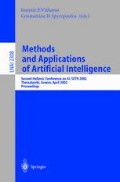Abstract
This paper deals with the generation of an evaluation model to be used for decision making. The paper proposes the automated selection of past problem cases and the automated synthesis of a new evaluation model, based on the cumulative experience stored in a knowledge base. In order to select the most promising past evaluation cases we propose the use of two metrics: their proximity to the new case and the degree of success. To add flexibility, we allow the user to express his preference on these two factors. After having selected a group of the most promising past evaluation cases, a method for deriving a new evaluation model, i.e. the weights and the scales of the attributes, is presented. The method covers both numerical and nominal attributes. The derived model can be used as a starting point for an interactive evaluation session. The overall process is illustrated through a real world situation, concerning the choice of 1-out-of n candidate ERP products for an enterprise information system.
Access this chapter
Tax calculation will be finalised at checkout
Purchases are for personal use only
Preview
Unable to display preview. Download preview PDF.
References
ISO/IEC 9126-1, Information Technology — Software quality characteristics and subcharacteristics (1996).
Keeney R.L. and Raiffa H., Decision with multiple objectives, John Wiley, New York (1976).
Kitchenham B., Towards a constructive quality model. Part 1: Software quality modeling, measurement and prediction, Software Engineering Journal (July 1987).
Krzanowski, W.J. 1993. Principles of Multivariate Analysis: A User’s Perspective. Oxford University Press.
Mosley V., How to assess tools efficiently and quantatively, IEEE-Software (May 1992).
Myrtveit I. and Stensrud S., A controlled experiment to access the benefits of estimating with analogy and regression models, IEEE Transactions on Software Engineering, 25(4):510–525, 1999.
Poston R.M. and Sexton M.P., Evaluating and selecting testing tools, IEEE Software, (May 1992).
Roy B., The outranking approach and the foundation of ELECTRE methods, Theory and Decision, 31 (1991), 49–73
Roy B., Multicriteria Methodology for Decision Aiding, Kluwer Academic, Dordrecht (1996).
Stamelos, I. Vlahavas, I. Refanidis and A. Tsoukias, “Knowledge Based Evaluation of Software Systems: A Case Study”, Information and Software Technology, Elsevier, vol. 20 (5), 333–345, April 2000
Stamelos, I. andA. Tsoukias, “Software Evaluation Problem Situations”, European Journal of Operational Research, Special Issue on Decision Support Systems, Elsevier, to appear
Vanderpooten D. and Vincke P., Description and analysis of some representative interactive multicriteria procedures, Mathematical and computer modelling, 12 (1989), 1221–1238.
Vincke P., Multicriteria decision aid, John Wiley, New York (1992).
Vlahavas, I., Stamelos, I., Refanidis I. and Tsoukias A., “ESSE: An Expert System for Software Evaluation”, Knowledge-Based Systems, Elsevier, vol. 12(4), pp. 183–197, 1999
Author information
Authors and Affiliations
Editor information
Editors and Affiliations
Rights and permissions
Copyright information
© 2002 Springer-Verlag Berlin Heidelberg
About this paper
Cite this paper
Stamelos, I., Refanidis, I. (2002). Decision Making Based on Past Problem Cases. In: Vlahavas, I.P., Spyropoulos, C.D. (eds) Methods and Applications of Artificial Intelligence. SETN 2002. Lecture Notes in Computer Science(), vol 2308. Springer, Berlin, Heidelberg. https://doi.org/10.1007/3-540-46014-4_5
Download citation
DOI: https://doi.org/10.1007/3-540-46014-4_5
Published:
Publisher Name: Springer, Berlin, Heidelberg
Print ISBN: 978-3-540-43472-6
Online ISBN: 978-3-540-46014-5
eBook Packages: Springer Book Archive

